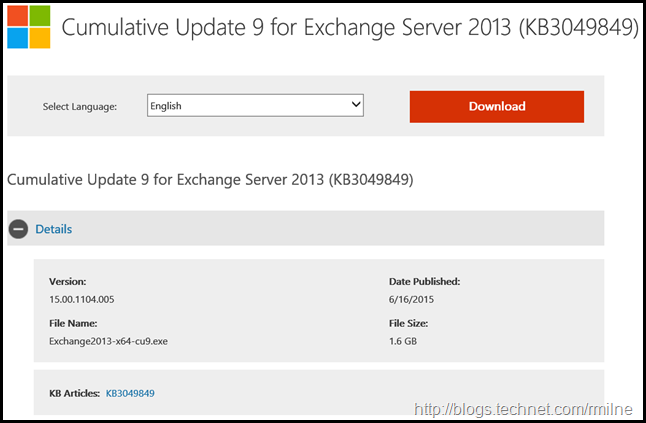Exchange 2013 CU9 has been released to the Microsoft download centre! Exchange 2013 has a different servicing strategy than Exchange 2007/2010 and utilises Cumulative Updates (CUs) rather than the Rollup Updates (RU/UR) which were used previously. CUs are a complete installation of Exchange 2013 and can be used to install a fresh server or to update a previously installed one. Exchange 2013 SP1 was in effect CU4, and CU9 is the fifth post SP1 release.
This is build 15.00.11104.005 of Exchange 2013 and the update is helpfully named Exchange2013-x64-cu9.exe. Which is a great improvement over the initial CUs that all had the same file name! Details for the release are contained in KB3049849.
Whether or not your AD Schema needs to be updated depends upon your initial Exchange 2013 version. This will dictate if the AD Schema needs to be modified. Check the values as noted in this post.
Updates Of Particular Note
- KB 3040683 System WLM overrides do not work when you do on-premises installations in Exchange Server 2013
- KB 3049081 OwaDeepTestProbe probe fails intermittently on a server that installs the Mailbox server role in Exchange Server 2013
Issues Resolved
- KB 2983216 Category setting on an item in Outlook jumps the selection to the top of the list in an Exchange Server 2013 environment
- KB 2988660 Role assignment with custom write scope fails in an Exchange Server 2013 environment
- KB 3003978 Email messages are displayed with incorrect format in Outlook in an Exchange Server 2013 environment
- KB 3006849 GSSAPI-based Kerberos authentication protocol is not offered to IMAP clients in Exchange Server 2013
- KB 3009631 Advanced Find against the Sent Items folder in Outlook returns no result in Exchange Server 2013
- KB 3032153 Recurring events in Calendar over DST are not adjusted on all ActiveSync devices in all Exchange Server environments
- KB 3040681 MapiExceptionTimeout error during a hierarchy synchronization process of multiple public folders in Exchange Server 2013
- KB 3040683 System WLM overrides do not work when you do on-premises installations in Exchange Server 2013
- KB 3049081 OwaDeepTestProbe probe fails intermittently on a server that installs the Mailbox server role in Exchange Server 2013
- KB 3049771 Outlook Web App logon page takes longer time than expected to time out in an Exchange Server 2013 environment
- KB 3050825 Dgetransport.exe starts to crash when PriorityQueuingEnabled is set to "True" in Exchange Server 2013
- KB 3050877 Emails that are sent as a secondary mailbox are not saved in the delegate's Sent Items folder in Exchange Server 2013
- KB 3055940 "Object reference not set to an instance" error when you install cumulative update in Exchange Server 2013
- KB 3056045 "Cannot find Template User object" error when you find contacts that use a consumer domain in Exchange Server 2013
- KB 3056413 SMTP connection fails when you log on with a child domain account and use NTLM authentication in Exchange Server 2013
- KB 3056817 Update adds the Let me select the message option in Outlook Web App in an Exchange Server 2013 environment
- KB 3056822 Dynamics CRM 2013 stops synchronizing items from mailbox in an Exchange Server 2013 environment
- KB 3060825 The MSExchangeDelivery service crashes when you receive an email message from a specific sender in Exchange Server 2013
- KB 3064393 "Bad Command. 12" error and IMAP CAPABILITY commands are not offered in an Exchange Server 2013 co-existence environment
- KB 3068681 RPC encryption requirement is re-enabled for RPC Client Access Service after you upgrade server in Exchange Server 2013
- KB 3069060 Recurring meetings are accepted when their time conflicts on the same room mailbox in Exchange Server 2013
- KB 3069501 Duplicate folders are created after a mailbox move in Exchange Server 2013 Enterprise
- KB 3071427 Outlook Web App still downloads web beacon contents when you forward email messages in Exchange Server 2013
Some Items For Consideration
As with previous CUs, CU9 follows the new servicing paradigm which was previously discussed on the blog. The CU9 package can be used to perform a new installation, or to upgrade an existing Exchange Server 2013 installation to CU9. You do not need to install Cumulative Update 1 or 2 for Exchange Server 2013 when you are installing CU9. Cumulative Updates are well, cumulative. What else can I say…
-
After you install this cumulative update package, you cannot uninstall the cumulative update package to revert to an earlier version of Exchange 2013. If you uninstall this cumulative update package, Exchange 2013 is removed from the server.
-
Ensure that you consult with all 3rd party vendors which exist as part of your messaging environment. This includes archive, mobility and management services.
-
Ensure that you do not forget to install this update on management servers, jump servers/workstations and application servers where the management tools were installed for an application. FIM and 3rd party user provisioning solutions are examples of the latter.
-
Disable file system antivirus prior to installing.
-
Once server has been restarted, re-enable file system antivirus.
-
Note that customised configuration files are overwritten on installation. Make sure you have any changes fully documented!
-
CU9 may contain AD Schema updates for your organisation – please test and plan accordingly! Whether or not your AD Schema needs to be updated depends upon your initial Exchange 2013 version. This will dictate if the AD Schema needs to be modified. Check the values as noted in this post.
Please enjoy the update responsibly!
What do I mean by that? Well, you need to ensure that you are fully informed about the caveats with the CU and are aware of all of the changes that it will make within your environment. Additionally you will need to test the CU your lab which is representative of your production environment.
Cheers,
Rhoderick
